#walk to Emmaus
Video
youtube
"Eyes Wide Open" Rev. Khalif Smith, April 23rd, 2023
Rev. Khalif Smith preaches "Eyes Wide Open" based on Luke 24: 13-35 during 9 am Worship on Sunday April 23rd, 2023.
Want to support the ministry at First United Methodist Church of Mesa?
Donate at https://app.sharefaith.com/app/giving/firs6957441
Watch the full Worship Service at Livestream.com/FirstChurchMesa
#youtube#eyes wide open#faith#first church of mesa#first church mesa#first umc of mesa#umc#united methodist church#united methodist#rev. khalif smith#khalif smith#mesa#mesa az#arizona#mesa arizona#downtown mesa#mesa churches#arizona churches#walk to emmaus
0 notes
Text

The road to Emmaus
#road to emmaus#walk with god#follower of jesus christ#traditional catholic#christian blog#catholic#mass readings#catholiscism#catholic art#holy mass#disc#biblical womanhood#bible in a year#Christian art#discipleship
19 notes
·
View notes
Text
When I found out that in his Waste Land endnotes T.S. Eliot said that the stanza “Who is the third who walks always beside you? / When I count, there are only you and I together / But when I look ahead up the white road / There is always another one walking beside you / Gliding wrapt in a brown mantle, hooded / I do not know whether a man or a woman / —But who is that on the other side of you?” was inspired by Shackleton’s Antarctic expedition when the explorers fell under the delusion that there was always one more person there with them than there actually was, my brain shattered into a million pieces and I never recovered.
#This is way to niche to be posting on Tumblr about but genuinely what the fuck#I’ve read the waste land so many times and the first time I read it I thought that this was clearly an allusion to#the two disciples on their way to Emmaus when they run into a third person they can’t recognize even though it’s Christ#And then the next few times I read it I though ‘oh okay this is obviously Tiresias since he has walked among the lowest of the dead#and the ambiguity of the gender is specifically indicated which is very Tiresias.’#And then I read the end notes! And it’s about a real honest to god phenomenon that dying people at the end of their tethers experience!!!#And it’s actually all three and it’s also death walking among them and a million other things. I want to kiss TS Eliot with tongue#the waste land
2 notes
·
View notes
Text
Devotional Hours Within the Bible
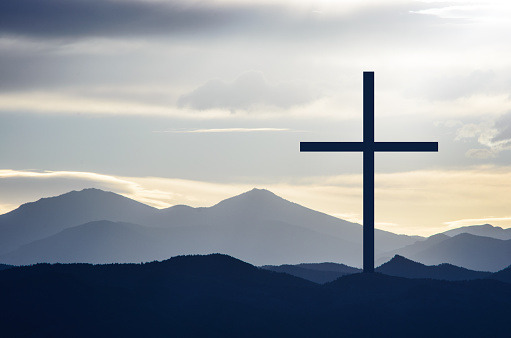
by J.R. Miller
The Walk to Emmaus (Luke 24:13-35)
Sometime in the afternoon of the day on which Jesus rose, two of His disciples, not apostles - but friends, took a long walk into the country. We are not told why they went to Emmaus. Perhaps they had given up hope. Thus it is too often with Christ's friends in these days, when trouble comes upon them. The bright dreams fade, they grow disheartened and turn away - as if the sacred beliefs they had cherished so long were only delusions. We see here, however, how needless was the discouragement. No hope really had faded. What they thought was cause for sorrow - was the secret of the most blessed hope the world ever has known.
As these men walked along the way, they talked together of the strange things which had happened. This was natural. Their hearts were full of these things, and they could not but talk about them. If the conversation of Christian people is sometimes vapid and trivial, it must be because their hearts are not filled with the holy themes which ought to occupy them. Is there much truly pious conversation? What did you talk about yesterday, or last evening, in the long walk you took with your friend? This example suggests to us, at least the value of good, earnest, wayside conversation. Most of us walk more or less with our friends. Why should two sincere Christians talk together for an hour or longer, and neither of them say one word better than the idlest chitchat about the merest nothings ?
Now a most interesting thing occurred. As they went on talking together, Jesus Himself drew near and walked with them. That is always the way. Jesus said, "Where two or three are gathered together in My name - there am I in the midst of them." We are met in His name - when love for Him draws us together. Then He will always join us. If only idle words are on our lips, if we are gossiping about our neighbors, saying mean and disagreeable things about them; if we are talking of things which are not beautiful and good - we have no reason to expect Christ to draw near and join us. He would not be interested in our conversation, nor would we care to have Him listening to what we are saying. In order to have Christ go with us in our walk - our talk must be of things which will be congenial to Him. This, therefore, is the test - Would Jesus want to enter into this conversation with us? Would He be pleased to hear the words we are saying drop from our lips?
Sometimes we join a group of busy talkers, and suddenly the conversation ceases. They do no want to go on with it, in our presence. Would we keep on with this talk of ours without embarrassment or sense of unfitness, if Jesus were to come in and sit down visibly in our circle?
He walked with these friends unrecognized. They did not know him. This is often the way with us - Jesus draws near to us and we fail to know that it is He. He comes to us in our sorrow, and we do not see Him by our side. We go on weeping and breaking our hearts, while if we saw the glorious form that is close to us, and knew of the love that is throbbing against our breasts - we would put away our tears and rejoice. Many people fail to recognize the divine love and comfort in their grief - and go on as if there were no stars shining in the sky. How may of us are conscious of the presence of Christ with us, or get from it the full comfort, inspiration, and help which we might get?
Sir Launfal, in Lowell's poem, wandered over all the earth in search of the Holy Grail. When at last, after long years had passed, he returned, aged and bent, to his old home - there under his own castle walls did he find the object of his search! Just so, often we would find close beside us, in the Scriptures we already possess, in the circumstances in which we are place, in the human tenderness that is about us - the help we are seeking and the truth we need, if only we had eyes to see.
The Stranger showed a deep interest in the two men. The sorrow in their faces and tones touched His heart. Jesus always has a quick ear and sensitive heart for human grief or need. He knows when we are sad; when our burden is greater than we can bear. Then He is quick to express sympathy. He wants to give help.
This conversation shows that Jesus desires His friends to confide in Him. It does good for a burdened heart to tell out its trouble to Him. So when these men spoke to Him of the things that filled their hearts that day, He asked, "What things?" He knew, of course; but He wanted them to speak out their fears and doubts and ask their questions. So, when we are in sorrow, Christ wants us to tell Him of all that troubles or perplexes us. The telling will do us good. Then, by bringing them to Him - we shall have the tangles unsnarled .
Jesus spoke to these disciples out of a loving heart, telling them how slow they were in believing in what the prophets had spoken. He then told them that it befit the Messiah, to suffer the very things which this Jesus they were grieving over, had suffered. He told them that if they had only understood the Scriptures, their hearts never would have been cast down by the things which had befallen Him. God's way is always the true one. Our way would not bring us to the glory we desire - any more than the disciples' idea of the Messiah would have brought salvation to the world. When God sets aside our plans for our lives - we may know that His plan, however different from ours it may be, and however it may seem to thwart our plans - is the right one.
These two men enjoyed a rare privilege that day in having Jesus as an interpreter of the Scriptures concerning Himself, "He expounded unto them in all the Scriptures, the things concerning Himself." It would be interesting if we could read the interpretations he gave. What a wonderful talk that was! We may be quite sure that He quoted the passages which depicted the sufferings of the Messiah, showing that the cross was part of the divine plan of redemption. Doubtless He quoted the fifty-third chapter of Isaiah. Thus He went over the Old Testament, interpreting it and showing how he had fulfilled these ancient predictions. No wonder their hearts burned within them - as He opened to them the Scriptures.
At length they came to the place where their journey ended. He was disposed to go on farther - but they urged Him to abide with them. If they had not thus constrained Him, He would have passed on. Think what they would have missed - if He had not gone in with them. We do not know how much of the revealing of divine love and grace we miss continually, because of the tameness of our praying. We ought to get a lesson from the example of these disciples, who constrained the Stranger to go in with them and were rewarded by finding in Him - the Friend for whom they were so hungering.
When they sat down together at the table for their evening meal, the Stranger took bread and blessed it, and broke it, and gave it to them. Perhaps it was these familiar acts which revealed Him to them. Or they may have seen the nail mark in the hand which broke the bread. We are not told how - but in some way they came to understand that the Guest at their table was Jesus Himself, whom they were mourning as dead - but who was now risen and living! What if our eyes would be opened to see Jesus every time He is beside us, eating with us, walking with us? How radiant would all life then become!
Another suggestion from this Emmaus story, is that often it is only as they leave us - that we learn the value of our blessings. "Their eyes were opened, and they knew Him; and He vanished out of their sight." How often it is rue that only in their vanishing, do our friends reveal themselves to us.
Somehow our eyes are blinded, and we do not see the loveliness. Faults seem larger and blemishes greater, while our friends are close to us. But as they leave us - the faults appear faults no longer, "just odd ways," and blemishes are transfigured into shining marks. Why wait for the hour of departing - to see the beauty and the good?
#James Russell Miller#Devotional Hours Within the Bible#The Walk to Emmaus#Luke 24:13-35#July 2#2022
7 notes
·
View notes
Text
Let's Take a Walk
I’ve loved seeing the Easter photos of families enjoying their Easter celebrations – their new Easter clothes, meals together, and egg hunts. My youngest two grands (16 and 18) still hunt for the eggs that their mama “rabbit” hid in their back yard. I know Mama Rabbit’s story – she wants to hold onto the traditions for as long as she can. She even had Easter baskets for the older brothers. She…
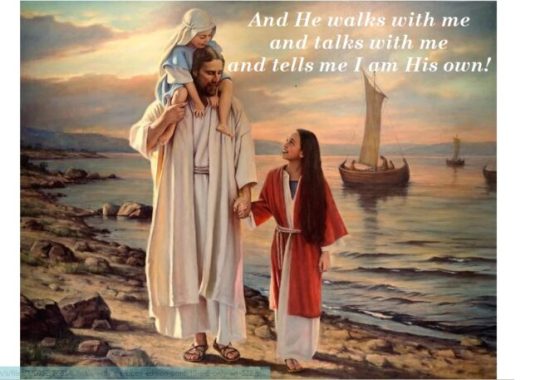
View On WordPress
#blog#christian#crucifixion#Easter#Emmaus#empty tomb#followers#hearts burned#inspiration#Jesus#lamp to our feet#light to our pathway#Luke 24:32#Monday after Easter#Psalm 119:105#resurrection#risen Lord#scripture#two disciples#walk#walk with Jesus
0 notes
Text
Elle Argent as Jesus Christ: Heartstopper art analysis.

Yesterday, I made this post where I wordlessly compared Elle's art piece for the Lambert School to the painting that draws her attention at the Louvre, Caravaggio's Supper at Emmaus, a depiction of Jesus breaking bread for his disciples after his crucifixion and subsequent rising.
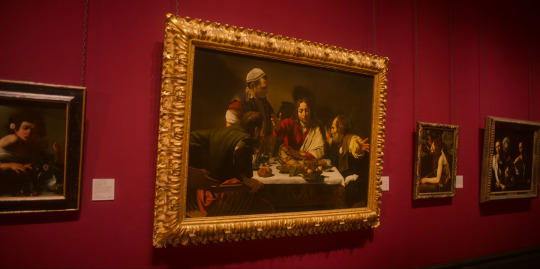
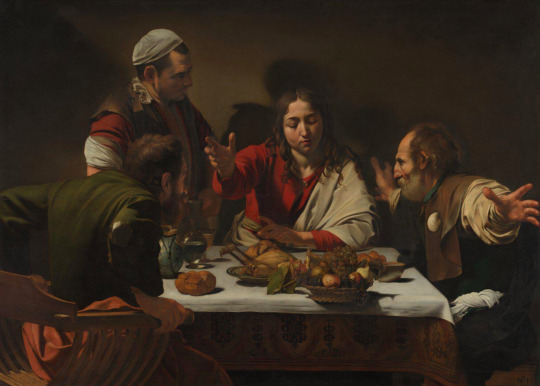
Elle's perspective on the painting / a full view of the painting (source)
The first thing I noticed that helped me draw the connection between these two paintings was their composition, the basic triangular lines that guide the eye in each painting; from Jesus and Elle in the center to the innkeeper and Tao at the top.
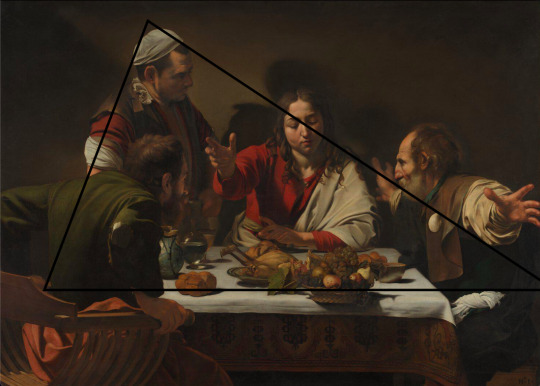
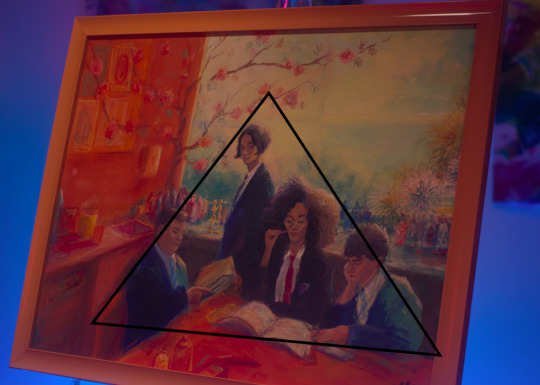
Heartstopper also clearly wanted us to make some connection between Elle and this Caravaggio: they focus on her face before they show us the painting, so we wonder what exactly it is she's seeing, which increases its narrative importance. I assumed she recognized herself in a painting; she did, but not in the way I expected.
The National Gallery (see above source) has this to say about the Caravaggio:
On the third day after the Crucifixion two of Jesus’s disciples were walking to Emmaus when they met the resurrected Christ. They failed to recognise him, but that evening at supper he ‘... took bread, and blessed it, and brake and gave to them. And their eyes were opened, and they knew him; and he vanished out of their sight’ (Luke 24: 30–31).
Painted at the height of Caravaggio’s fame, this is among his most impressive domestic religious pictures. He brilliantly captures the dramatic climax of the story, the moment when the disciples suddenly see what has been in front of them all along. Their actions convey their astonishment: one is about to leap out of his chair while the other throws out his arms in a gesture of disbelief. The stark lighting underlines the dramatic intensity of the scene.
Typically for Caravaggio, he has shown the disciples as ordinary working men, with bearded, lined faces and ragged clothes, in contrast to the youthful beardless Christ, who seems to have come from a different world.
Jesus, in the story, opens the eyes of his disciples in more ways than one (I pulled my Bible out for this!). First, in the scene depicted in the painting, the disciples do not know that this man is Jesus until he blesses the bread and breaks it for them, revealing himself as Christ. Second is the context in which Jesus comes to share dinner with his disciples: they meet him on the road during the day before, and he interprets the Old Testament for them: (stay with me I promise we'll leave the Biblical stuff and get back to the gay stuff soon)
Luke 24:13-16 Now on that same day two of [the disciples] were going to a village called Emmaus, about seven miles from Jerusalem, and talking with each other about all these things that had happened. While they were talking and discussing, Jesus himself came near and went with them, but their eyes were kept from recognizing him.
Luke 24:25-27 Then he said to them, "Oh, how foolish you are, and how slow of heart to believe all that the prophets have declared! Was it not necessary that the Messiah should suffer these things and then enter into his glory?" Then beginning with Moses and all the prophets, he interpreted to them the things about himself in all the scriptures.
If Safe Space is an exact analogue to Supper at Emmaus, then Elle takes the position of Jesus, and she draws from the story of Christ's crucifixion and rising a trans metaphor.
Death does not always mean death. For example, in the world of tarot, the card of Death does not signify literal Death, but a transformation: that the idea of death is a catalyst for change. If you're trans or non-binary, you understand the idea of the person you were being dead; that's why they call it a deadname. For me, the girl I was is dead. The person I am now, a living, breathing, non-binary person, is alive.
Jesus died and lived again; the boy Elle was died and the girl Elle is lived. Elle takes the spot of Jesus. Elle is risen.
There's another half to this metaphor: of the disciples that don't recognize Jesus. See where I'm going with this? At first, after Jesus had undergone his transformation, the disciples do not recognize him; literally "Their eyes were kept from recognizing him." The fault is not on them – it is another stronger force that maintains their blindness. But Jesus stays with them, despite the fact that they don't know who he is, and he talks to them about the scriptures.
We don't know much about Elle, pre-transition. But we know that Elle, Tao, and Charlie, at least, were friends before Elle's transition, and she had to come out to them at some point. So, in essence, she is Jesus on the road to Emmaus; unrecognized, a stranger, until she reveals herself for who she is.
She takes the moment Jesus tells his disciples who he is and shows what happens when Elle stays. We don't all have the luxury of being the Son of God, who can just pop away at a moment's notice after coming back from the dead (which is what he does, in the story: once the disciples have their eyes opened, he leaves). But this is Elle, out, resurrected, staying.
"So. There've been a lot of changes in my life over the last couple years. But with this piece I guess I wanted to capture a place that holds a lot of happy memories. Even in the darker times. Somewhere I always felt safe."
Safe Space comes after the moment of realization, after Elle comes out, after her friends' eyes are opened. But implied in its source and its inspiration is the moment of truth, the moment of coming out. There's been a lot of that, this season, coming out. There's people that want to and are scared, and people that refuse to and walk away. We never had to go on that journey with Elle. But she's telling us about it, now. She's telling us that it was glorious, that it was godly, that it was religious, that she died and was resurrected.
Before I leave, I want to touch on Tao's importance in this piece. The disciples in Supper are the two men that are seated; the man standing is the innkeeper, who is not quite a part of Jesus' world. Interesting, that Charlie and Isaac, the two people of Elle's group who are part of the queer community, take the place of the two disciples, and Tao, the token straight friend, is standing in the place of the innkeeper; not a follower of Jesus but a witness to the miracle of his resurrection anyway. They are all different people in this painting; different identities, different lives, different loves. But they were all there to witness Elle revealing herself in her resurrection. Tao, afraid of being left alone, is brought into this inner sanctum of Elle's world. Into her safe space.
#heartstopper#heartstopper spoilers#heartstopper analysis#heartstopper meta#elle argent#tao xu#charlie spring#isaac henderson#heartstopper season 2#my stuff#i am absolutely in love with this analysis#and i hope that everyone else likes it too!!!#userbarrow#userelletao
243 notes
·
View notes
Text
The road away
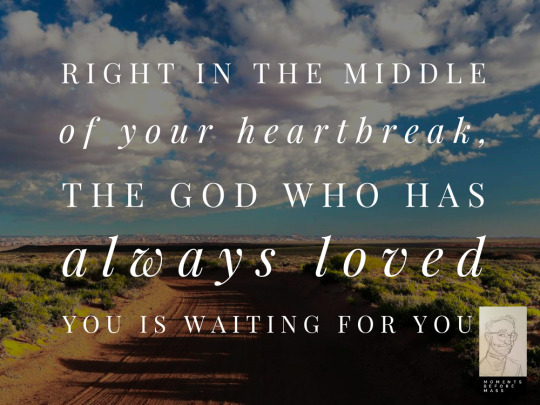
Today’s Gospel is the one about the disciples on the road to Emmaus. It’s a real town, a suburb of Jerusalem that goes by Al Qubeiba these days. But the name really doesn’t matter.
What matters is the name of the road. Because whatever you call the town, the road to it really isn’t the road to anything. In truth, it’s the road away.
For the disciples who are headed home, with the tragedy and horror of Good Friday fresh in their minds, with their hearts broken? For them, it’s the road away from the Jesus they knew and followed.
It’s the road away from deliverance. The road away from healing. The road away from hope.
You and I know exactly how it feels. Because we’ve gotten our hearts broken too, and found ourselves walking down the road away.
Maybe it was the road away after a death. Maybe it was the road away from a relationship that didn’t work out. Maybe it was the road away from sobriety. Maybe it was the road away from family that rejected us. Maybe it was the road away from faith.
Whatever it was, whether someone did it to us, we did it to ourselves, or it just happened, the reason we’re on the road away really doesn’t matter. Because it all hurts just as much.
But no matter what heartbreak sets us on the road away, just like the disciples in today’s Gospel, there’s Someone waiting for us on the road away.
Right in the middle of your heartbreak, the God who made you, the One who has always loved you, is waiting for you. Just for the chance to be with you.
Just for the chance to walk with you, at your pace.
To listen to you, as it all comes tumbling out.
To talk with you, about what’s breaking your heart.
To love you, unconditionally.
To stay with you, always.
To heal you, for however long it takes.
Until the road away becomes the road to Home.
Today’s Readings
#Heartbreak#The road away#Road to Emmaus#Heartbroken#Healing#Hope#Deliverance#God's Love#God#Jesus#Catholic#Christian#Church#Catholicism#Moments Before Mass
25 notes
·
View notes
Text

3rd April >> Mass Readings (USA)
Easter Wednesday
(Liturgical Colour: White. Year: B(II))
First Reading
Acts of the Apostles 3:1–10
What I do have I give you: in the name of the Lord Jesus, rise and walk.
Peter and John were going up to the temple area for the three o’clock hour of prayer. And a man crippled from birth was carried and placed at the gate of the temple called “the Beautiful Gate” every day to beg for alms from the people who entered the temple. When he saw Peter and John about to go into the temple, he asked for alms. But Peter looked intently at him, as did John, and said, “Look at us.” He paid attention to them, expecting to receive something from them. Peter said, “I have neither silver nor gold, but what I do have I give you: in the name of Jesus Christ the Nazorean, rise and walk.” Then Peter took him by the right hand and raised him up, and immediately his feet and ankles grew strong. He leaped up, stood, and walked around, and went into the temple with them, walking and jumping and praising God. When all the people saw him walking and praising God, they recognized him as the one who used to sit begging at the Beautiful Gate of the temple, and they were filled with amazement and astonishment at what had happened to him.
The Word of the Lord
R/ Thanks be to God.
Responsorial Psalm
Psalm 105:1–2, 3–4, 6–7, 8–9
R/ Rejoice, O hearts that seek the Lord.
or
R/ Alleluia.
Give thanks to the LORD, invoke his name;
make known among the nations his deeds.
Sing to him, sing his praise,
proclaim all his wondrous deeds.
R/ Rejoice, O hearts that seek the Lord.
or
R/ Alleluia.
Glory in his holy name;
rejoice, O hearts that seek the LORD!
Look to the LORD in his strength;
seek to serve him constantly.
R/ Rejoice, O hearts that seek the Lord.
or
R/ Alleluia.
You descendants of Abraham, his servants,
sons of Jacob, his chosen ones!
He, the LORD, is our God;
throughout the earth his judgments prevail.
R/ Rejoice, O hearts that seek the Lord.
or
R/ Alleluia.
He remembers forever his covenant
which he made binding for a thousand generations—
Which he entered into with Abraham
and by his oath to Isaac.
R/ Rejoice, O hearts that seek the Lord.
or
R/ Alleluia.
Sequence
Victimae Paschali Laudes
Christians, to the Paschal Victim
Offer your thankful praises!
A Lamb the sheep redeems;
Christ, who only is sinless,
Reconciles sinners to the Father.
Death and life have contended in that combat stupendous:
The Prince of life, who died, reigns immortal.
Speak, Mary, declaring
What you saw, wayfaring.
“The tomb of Christ, who is living,
The glory of Jesus’ resurrection;
bright angels attesting,
The shroud and napkin resting.
Yes, Christ my hope is arisen;
to Galilee he goes before you.”
Christ indeed from death is risen, our new life obtaining.
Have mercy, victor King, ever reigning!
Amen. Alleluia.
Gospel Acclamation
Psalm 118:24
Alleluia, alleluia.
This is the day the LORD has made;
let us be glad and rejoice in it.
Alleluia, alleluia.
Gospel
Luke 24:13–35
They recognized Jesus in the breaking of the bread.
That very day, the first day of the week, two of Jesus’ disciples were going to a village seven miles from Jerusalem called Emmaus, and they were conversing about all the things that had occurred. And it happened that while they were conversing and debating, Jesus himself drew near and walked with them, but their eyes were prevented from recognizing him. He asked them, “What are you discussing as you walk along?” They stopped, looking downcast. One of them, named Cleopas, said to him in reply, “Are you the only visitor to Jerusalem who does not know of the things that have taken place there in these days?” And he replied to them, “What sort of things?” They said to him, “The things that happened to Jesus the Nazarene, who was a prophet mighty in deed and word before God and all the people, how our chief priests and rulers both handed him over to a sentence of death and crucified him. But we were hoping that he would be the one to redeem Israel; and besides all this, it is now the third day since this took place. Some women from our group, however, have astounded us: they were at the tomb early in the morning and did not find his Body; they came back and reported that they had indeed seen a vision of angels who announced that he was alive. Then some of those with us went to the tomb and found things just as the women had described, but him they did not see.” And he said to them, “Oh, how foolish you are! How slow of heart to believe all that the prophets spoke! Was it not necessary that the Christ should suffer these things and enter into his glory?” Then beginning with Moses and all the prophets, he interpreted to them what referred to him in all the Scriptures. As they approached the village to which they were going, he gave the impression that he was going on farther. But they urged him, “Stay with us, for it is nearly evening and the day is almost over.” So he went in to stay with them. And it happened that, while he was with them at table, he took bread, said the blessing, broke it, and gave it to them. With that their eyes were opened and they recognized him, but he vanished from their sight. Then they said to each other, “Were not our hearts burning within us while he spoke to us on the way and opened the Scriptures to us?” So they set out at once and returned to Jerusalem where they found gathered together the Eleven and those with them who were saying, “The Lord has truly been raised and has appeared to Simon!” Then the two recounted what had taken place on the way and how he was made known to them in the breaking of the bread.
The Gospel of the Lord
R/ Praise to you, Lord Jesus Christ.
9 notes
·
View notes
Text
Luke 24:13-35
Easter Wednesday - The Supper at Emmaus
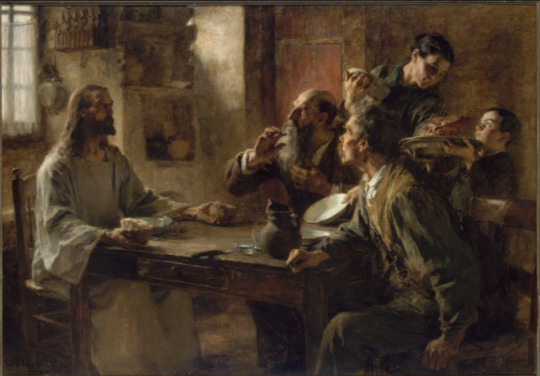
Friend of the Humble (Supper at Emmaus),
Painted by Léon-Augustin L'Hermitte (1824-1925),
Painted in 1892,
Oil on canvas
© Museum of Fine Arts, Boston
Gospel Reading
Two of the disciples of Jesus were on their way to a village called Emmaus, seven miles from Jerusalem, and they were talking together about all that had happened. Now as they talked this over, Jesus himself came up and walked by their side; but something prevented them from recognising him. He said to them, ‘What matters are you discussing as you walk along?’ They stopped short, their faces downcast.
Then one of them, called Cleopas, answered him, ‘You must be the only person staying in Jerusalem who does not know the things that have been happening there these last few days.’ ‘What things?’ he asked. ‘All about Jesus of Nazareth’ they answered ‘who proved he was a great prophet by the things he said and did in the sight of God and of the whole people; and how our chief priests and our leaders handed him over to be sentenced to death, and had him crucified. Our own hope had been that he would be the one to set Israel free. And this is not all: two whole days have gone by since it all happened; and some women from our group have astounded us: they went to the tomb in the early morning, and when they did not find the body, they came back to tell us they had seen a vision of angels who declared he was alive. Some of our friends went to the tomb and found everything exactly as the women had reported, but of him they saw nothing.’
Then he said to them, ‘You foolish men! So slow to believe the full message of the prophets! Was it not ordained that the Christ should suffer and so enter into his glory?’ Then, starting with Moses and going through all the prophets, he explained to them the passages throughout the scriptures that were about himself.
When they drew near to the village to which they were going, he made as if to go on; but they pressed him to stay with them. ‘It is nearly evening’ they said ‘and the day is almost over.’ So he went in to stay with them. Now while he was with them at table, he took the bread and said the blessing; then he broke it and handed it to them. And their eyes were opened and they recognised him; but he had vanished from their sight. Then they said to each other, ‘Did not our hearts burn within us as he talked to us on the road and explained the scriptures to us?’
They set out that instant and returned to Jerusalem. There they found the Eleven assembled together with their companions, who said to them, ‘Yes, it is true. The Lord has risen and has appeared to Simon.’ Then they told their story of what had happened on the road and how they had recognised him at the breaking of bread.
Reflection on the painting
Our painting combines today's Gospel story, where Jesus is breaking bread and the onlookers suddenly recognise him, with portraying Jesus as Friend of the Humble, the title of our painting. I do think this is a beautiful, gentle, gripping painting. Three generations of a family are depicted, sharing a meal. Before Léon-Augustin L'Hermitte painted this canvas it would be fair to say that artists always tried to represent Jesus as majestic, full of glory and maybe somewhat distant from normal day-to-day life. Our artist masterfully places Jesus in a contemporary setting of 1892, when this was painted. The painting emphasises that Jesus became human and that he did walk among us.
Vincent van Gogh was one of L'Hermitte's greatest admirers. In one of his letters he wrote: "If every month Le Monde Illustré published one of his compositions... it would be a great pleasure for me to be able to follow it. It is certain that for years I have not seen anything as beautiful as this scene by L'Hermitte... I am too preoccupied by L'Hermitte this evening to be able to talk of other things." Quite the accolade to have Van Gogh write about one's artistry this way.
As the risen Lord approached the two disciples, his first act was to draw them into conversation, asking them to share the nature of their discussion. He sought to hear their tale; a tale filled with sorrow and loss. He wanted to fully engage with them in their moment of grief. He accepted them as they were, demonstrating a profound respect for their current state on their spiritual journey. This is precisely how the Lord presents himself to us: he encounters us in our present circumstances, encouraging us to open our hearts to him, to express our deepest thoughts and feelings. It was only after attentively hearing the disciples' lament that the unrecognized visitor responded. His words cast their despairing narrative in an entirely new light. He made sense of their grief, by placing it in the greater narrative of God's plan - a narrative not concluded by death, but crowned with light and triumph.
by Father Patrick van der Vorst
#biblical art#bible reflection#religious art#reflection#christian blog#jesus#bible reading#christian doctrine#bible scripture#biblical#glorytogod#bible#faith in jesus#bible study#artwork#art history#article#share the gospel#spiritual healing#kingdom of heaven#follow jesus#spread the word#inspiration#faith in god#illustration#God#Jesus Christ
7 notes
·
View notes
Text
𝐀𝐩𝐫𝐢𝐥 𝟑, 𝟐𝟎𝟐𝟒 𝐆𝐨𝐬𝐩𝐞𝐥
Wednesday in the Octave of Easter
Lk 24:13-35
That very day, the first day of the week,
two of Jesus’ disciples were going
to a village seven miles from Jerusalem called Emmaus,
and they were conversing about all the things that had occurred.
And it happened that while they were conversing and debating,
Jesus himself drew near and walked with them,
but their eyes were prevented from recognizing him.
He asked them,
“What are you discussing as you walk along?”
They stopped, looking downcast.
One of them, named Cleopas, said to him in reply,
“Are you the only visitor to Jerusalem
who does not know of the things
that have taken place there in these days?”
And he replied to them, “What sort of things?”
They said to him,
“The things that happened to Jesus the Nazarene,
who was a prophet mighty in deed and word
before God and all the people,
how our chief priests and rulers both handed him over
to a sentence of death and crucified him.
But we were hoping that he would be the one to redeem Israel;
and besides all this,
it is now the third day since this took place.
Some women from our group, however, have astounded us:
they were at the tomb early in the morning
and did not find his Body;
they came back and reported
that they had indeed seen a vision of angels
who announced that he was alive.
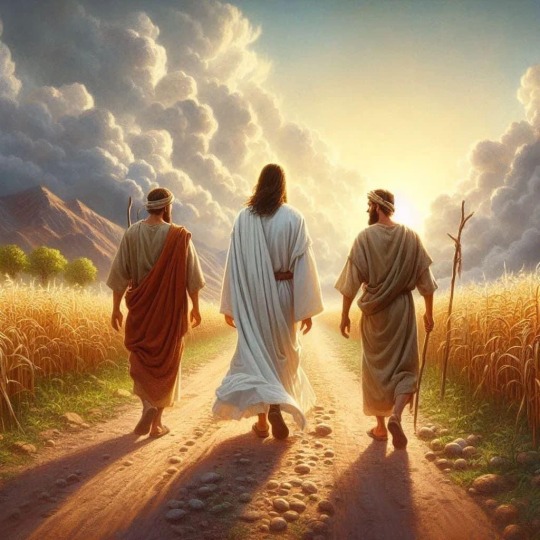
#jesus#catholic#my remnant army#jesus christ#virgin mary#faithoverfear#saints#jesusisgod#endtimes#Jesus is coming#word of God#bible verse of the day#come holy spirit
12 notes
·
View notes
Text
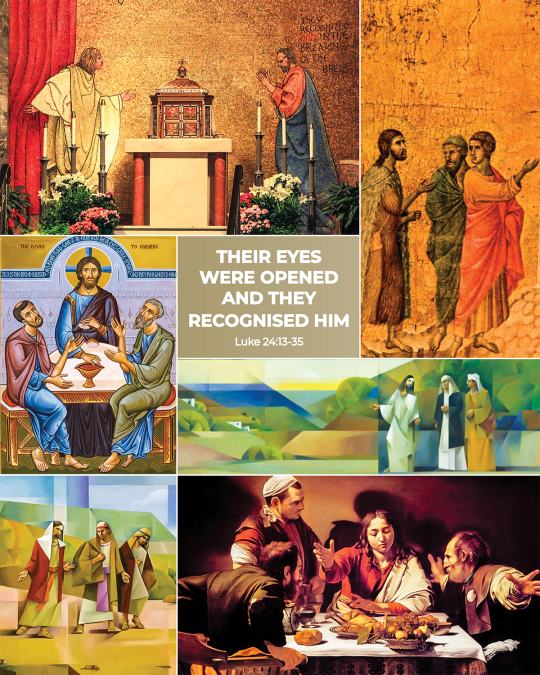
Two of the disciples of Jesus were on their way to a village called Emmaus, seven miles from Jerusalem, and they were talking together about all that had happened. Now as they talked this over, Jesus himself came up and walked by their side; but something prevented them from recognising him. He said to them, ‘What matters are you discussing as you walk along?’ They stopped short, their faces downcast.
Then one of them, called Cleopas, answered him, ‘You must be the only person staying in Jerusalem who does not know the things that have been happening there these last few days.’ ‘What things?’ he asked. ‘All about Jesus of Nazareth’ they answered ‘who proved he was a great prophet by the things he said and did in the sight of God and of the whole people; and how our chief priests and our leaders handed him over to be sentenced to death, and had him crucified. Our own hope had been that he would be the one to set Israel free. And this is not all: two whole days have gone by since it all happened; and some women from our group have astounded us: they went to the tomb in the early morning, and when they did not find the body, they came back to tell us they had seen a vision of angels who declared he was alive. Some of our friends went to the tomb and found everything exactly as the women had reported, but of him they saw nothing.’
Then he said to them, ‘You foolish men! So slow to believe the full message of the prophets! Was it not ordained that the Christ should suffer and so enter into his glory?’ Then, starting with Moses and going through all the prophets, he explained to them the passages throughout the scriptures that were about himself.
When they drew near to the village to which they were going, he made as if to go on; but they pressed him to stay with them. ‘It is nearly evening’ they said ‘and the day is almost over.’ So he went in to stay with them. Now while he was with them at table, he took the bread and said the blessing; then he broke it and handed it to them. And their eyes were opened and they recognised him; but he had vanished from their sight. Then they said to each other, ‘Did not our hearts burn within us as he talked to us on the road and explained the scriptures to us?’
They set out that instant and returned to Jerusalem. There they found the Eleven assembled together with their companions, who said to them, ‘Yes, it is true. The Lord has risen and has appeared to Simon.’ Then they told their story of what had happened on the road and how they had recognised him at the breaking of bread.
[Luke 24:13-35]
#lectiodivina#scripture#catholic#christianity#carmelite#carmelites#prayer#faith#spirituality#kingdomofgod#goodnews#godslove#forgiveness#peace#hope#love#courage#newtestament#easter#gospel#jesus#christ#truth#holyspirit#lightofchrist#salvation#roadtoemmaus
9 notes
·
View notes
Text

Supper at Emmaus
Caravaggio (Michelangelo Merisi) (Italian; 1571–1610)
1606
Oil on canvas
Pinacoteca di Brera, Milan, Italy
Then arose Peter, and ran unto the sepulchre; and stooping down, he beheld the linen clothes laid by themselves, and departed, wondering in himself at that which was come to pass. And, behold, two of them went that same day to a village called Emmaus, which was from Jerusalem about threescore furlongs. And they talked together of all these things which had happened. And it came to pass, that, while they communed together and reasoned, Jesus himself drew near, and went with them. But their eyes were holden that they should not know him. And he said unto them, What manner of communications are these that ye have one to another, as ye walk, and are sad? And the one of them, whose name was Cleopas, answering said unto him, Art thou only a stranger in Jerusalem, and hast not known the things which are come to pass there in these days? And he said unto them, What things? And they said unto him, Concerning Jesus of Nazareth, which was a prophet mighty in deed and word before God and all the people: And how the chief priests and our rulers delivered him to be condemned to death, and have crucified him.… And they drew nigh unto the village, whither they went: and he made as though he would have gone further. But they constrained him, saying, Abide with us: for it is toward evening, and the day is far spent. And he went in to tarry with them. And it came to pass, as he sat at meat with them, he took bread, and blessed it, and brake, and gave to them. And their eyes were opened, and they knew him; and he vanished out of their sight. And they said one to another, Did not our heart burn within us, while he talked with us by the way, and while he opened to us the scriptures? (Luke 24: 12–20, 28–32)
#Caravaggio#Michelangelo Merisi#Supper at Emmaus#Emmaus#Italian painters#Italian paintings#Italian artists#Italian art#Baroque art#1600s#17th century#17th-century art#17th-century Italian art#17th-century Italian artists#Pinacoteca di Brera#suppers#tables#pitchers#servants#disciples#shadows#chiaroscuro#gestures#bread#miracles#religious art#robes#Jesus#Jesus Christ
16 notes
·
View notes
Text
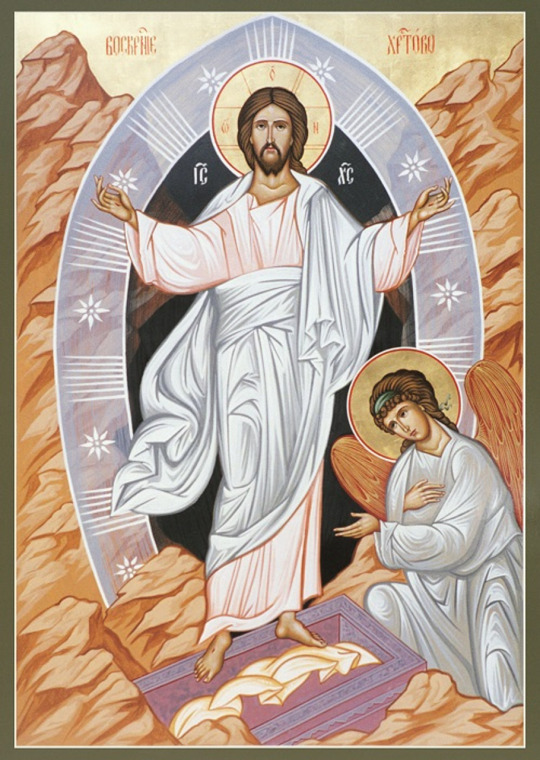
When two of the disciples of Christ were walking on the road to Emmaus (Luke, CH. 24). Christ Himself, on the very day of His resurrection, joined them and began walking with them, asking them why they were so excited. They in turn began asking Him if He was the only one who did not know what had happened in Jerusalem. They said that there was a great prophet who had been killed and then had allegedly risen from the dead; but they did not know what to believe. Christ then began to open their hearts and to explain what the Old Testament said was going to happen to the Messiah. All this time the disciples did not recognise Him, for He did not come to them with signs and wonders to dazzle them. Later on, when they came to Emmaus, Christ made as though He would have gone further, and He would have departed from them unrecognized had they not asked Him -- out of simple love for a stranger in need -- to spend the night with them. Finally, when He sat down with them and 'broke the bread' as He had done at the Last Supper, their eyes were opened, they saw that it was Christ Himself, and then He vanished right before their eyes. They began to question themselves and remembered that, all the time He had been with them walking on the road, they had had a burning in their hearts, even though they had not recognized Him. What made them recognize Christ in the end was this 'burning heart,' and not just the fact that He vanished out of their sight, because magicians can do that also. Therefore, it is not first of all miracles which reveal God to men, but something about God is revealed to a heart that is ready for it. This is what is meant by a 'burning heart.' by which the two disciples had contact with God Who came in the flesh.
-- God's Revelation to the Human Heart by Father Seraphim Rose
5 notes
·
View notes
Text
Walking with Jesus on the Road to Emmaus
Miracle 4 - New Testament
That very day two of them were going to a village named Emmaus, about seven miles from Jerusalem, and they were talking with each other about all these things that had happened. While they were talking and discussing together, Jesus himself drew near and went with them. But their eyes were kept from recognizing him. And He said to them, “What is this conversation that you are holding with each other as you walk?” And they stood still, looking sad. Then one of them, named Cleopas, answered Him, “Are you the only visitor to Jerusalem who does not know the things that have happened there in these days?” And He said to them, “What things?” And they said to Him, “Concerning Jesus of Nazareth, a man who was a prophet mighty in deed and word before God and all the people, and how our chief priests and rulers delivered Him up to be condemned to death, and crucified Him. But we had hoped that He was the one to redeem Israel. Yes, and besides all this, it is now the third day since these things happened.
But they urged him strongly, saying, “Stay with us, for it is toward evening and the day is now far spent.” So He went in to stay with them. When He was at table with them, He took the bread and blessed and broke it and gave it to them. And their eyes were opened, and they recognized Him. And He vanished from their sight. - Luke 24:12-21; 29-31
3 notes
·
View notes
Link
by C.R. Carmichael | As we walk down the road to Christmas Day, may we as joyful disciples draw alongside the true Jesus, our risen Lord and Savior, and learn from Him as He tarries with us along the way. Yes, sometimes it is hard to see Him in the dimness of this dark world; but through faith, our Savior is as real to us as if we saw Him with mortal eyes...
4 notes
·
View notes
Text

The Third Sunday of Easter
April 14, 2024
Pastor Tom Steers
Christ the Saviour Lutheran Church, Toronto
Lutheran Service Book
Divine Service III – Pages 184-202
OPENING HYMNN: 475 “Good Christian Friends, Rejoice and Sing”
https://www.youtube.com/watch?v=AwrOot61ETc
Pastor: Halleluiah, Christ is risen!
Congregation: He is risen indeed. Halleluiah!
The Introit:
Psalm 133
Behold, how good and pleasant it is
when brothers dwell in unity!
2 It is like the precious oil on the head,
running down on the beard,
on the beard of Aaron,
running down on the collar of his robes!
3 It is like the dew of Hermon,
which falls on the mountains of Zion!
For there the Lord has commanded the blessing,
life forevermore.
The Salutation – Pastor: The Lord be with you. Congregation: And also with you.
Collect Prayer:
O God, through the sacrifice of Your Son
You raised up the fallen world.
Through His death and resurrection,
He has earned us eternal life.
Grant that on our walk through this life we bear witness to our Saviour;
through Jesus Christ, our Lord,
who lives and reigns with You and the Holy Spirit, one God, now and forever. Amen.
Our Bible Readings:
First Reading – Acts 2:14a, 36-42
Psalm 116, verses 1-14
Epistle Reading – 1st Peter 1:17-25
(This week we use the text from Luke on the Emmaus disciples. The three-year lectionary Gospel passage today is Luke’s account of Jesus’ appearance to the disciples, which we read of last week in John 20:19-31. The one-year lectionary text for today is the three-year lectionary Gospel passage for next Sunday, which we will have as our reading on April 21st.)
Gospel Reading – Luke 24:13-35
THE APOSTLES’ CREED – Page 192
HYMN OF THE DAY: 476 “Who Are You Who Walk in Sorrow”
youtube
THE SERMON –
This road we call life is, at times, a difficult one.
We can feel alone, and even be led to despair, over hardship, disappointment, and loss.
The things we face in this world can cloud our vision, especially of the things of God.
We can become blind and forgetful of what God has said to us, and promised.
It was this way with two disciples of Jesus on the afternoon of the first Easter.
They were walking towards a town called Emmaus.
For some Christians, the Easter Gospel could very well begin with the words, “A long time ago in a place far away.”
Or in other words they’ve lost a personal connection to the resurrection.
For them it only has a past and future significance, but no present, every day value.
When life takes a downward turn, as it does from time to time, they don’t feel the presence of their Saviour, but are lost in the griefs of the day.
And they may try to fill this perceived void, what they feel is an absence of God, with a personal ‘works righteousness.’
Not seeing their Lord, not seeing the Gospel, they try to fill the emptiness with the Law of God.
What they say in effect is that while Christ is gone and we’re left to our own devices here’s what you need to do.
And it’s an attempt to fill the empty tomb of Jesus with a false belief that we must be perfect before Christ will reappear to us.
But this is what makes us as a Church, as Biblical Lutheran followers of Christ, different.
Because we not only celebrate a past event – the resurrection.
We don’t just say, ‘Christ is Risen,’ and gone back to heaven, and one day we’ll see Him again.
No, we celebrate the living, triumphant Jesus Christ.
As the Church we celebrate the marriage feast of the Bridegroom who laid down His life for us and in a very real and present way, is with us today: in Spirit, in His Holy Word, and in His Body and Blood in the Lord’s Supper.
Consider the Gospel account in today’s reading.
The two disciples on the road to Emmaus knew the Scriptures.
But they hadn’t really taken them in, they hadn’t truly understood them.
Because they didn’t see Jesus in them from start to finish.
And at first, they don’t see Christ in front of them on that road.
Physical sight alone, is not enough to recognize who Christ is.
Human reason is not sufficient to recognize Jesus as the Risen Saviour.
Christ had directly told the disciples He would die and rise again on the third day.
But until He appeared to them, they didn’t believe.
No, our eyes and ears must be opened by God Himself.
It took God’s only Son, Jesus to reveal His presence.
The hearts of the Emmaus disciples burned with joy as they understood the Scriptures when explained by Christ.
Here is one of many places where Jesus tells us how to interpret the Bible correctly.
Jesus tells us that if you do not see the Bible as God’s Word and see Him throughout it you get lost on the road; you won’t see Christ even when He’s right in front of you.
As Lutherans we believe that from the very first verses of Moses through to the prophets and all Scripture, God’s Holy Word is about Jesus.
He’s there in the Garden of Eden in God’s promise that a Saviour would come.
He’s present throughout the Old Testament, as well as the New.
It’s all about our Saviour, for us.
When Jesus is the key to scripture the Bible is not a tangled dead-end road.
When Jesus is the key to scripture, we understand God’s Law is a mirror that shows us our sin and a guide for us, but not the means of salvation.
Jesus used the scriptures to reassure the grieving, despairing Emmaus disciples.
They thought they’d been left alone.
But Christ shows them the crucifixion was not the end of the dreams and hopes of His followers.
The cross was part of the plan of redemption, of real freedom for every nation, every human being.
Christ explained that the cross was the instrument of salvation in paying our sin debt.
If there was no crucifixion, there would be no resurrection, for Jesus, or us.
Perhaps one of the best statements on this comes from the end of last week’s Gospel reading, in John, Chapter 20 (verses 30-31), when the Apostle wrote:
“Now Jesus did many other signs in the presence of the disciples, but these things are written that you may believe that Jesus is the Christ, the Son of God, and that by believing you may have life in His name.”
But for the Emmaus disciples until Christ took the bread and blessed it, as He did on the night of the Last Supper, that their eyes of faith were opened.
It took Christ Himself to open their eyes and minds, to accept that their living Saviour was there with them.
It’s the same for us.
When He instituted the Lord’s Supper Christ told us, ‘As often as you do this remember me, remember what I’ve said, remember what it means – He gave them the bread and said, “this is my body.”
He gave them the wine and said, “This is my blood shed for You for the remission of sins.”
Remember that in this Sacrament Christ is saying I remain with you, forgiving you.
And so, on this evening of Easter, three days after the crucifixion, the risen Lord
is with His disciples again.
He reveals Himself in the breaking of the bread, then vanished from their sight.
Notice that John doesn’t write Christ was no longer with them, but just that they could no longer see Him.
He was still, truly with them, in Spirit.
He had told them again, how he would remain to be with us.
Brothers and sisters, today, through the eyes of faith, we see Jesus with us again in His Holy Word, and will see Him in His Sacrament as we come to the altar for Communion.
We are not alone.
We have not been left as orphans.
Christ said, ‘lo I am with you always even unto the end of the world.’
This is the joy of Easter.
It’s not only a commemoration, but a true celebration of His resurrection and current presence with us.
In churches that do not honour the Lord’s Supper, they behave as though only moral perfection will earn you a ticket to see Christ again.
In churches that have gone back to the way of the Pharisees in seeing the Law as a way of self-justification they cannot see the risen, and forgiving Saviour with them.
But Christ came to fulfill the Law in a way we can’t, and promises to be with believing Christians, forgiving us, imperfect though we are.
And although the difficulties on the road of life are still there, the end for us isn’t death.
As the Bible says, ‘Death has been swallowed up in victory.’
Jesus is with us not only on Ester Sunday but in every ordinary day, in every pain and sorrow, and whenever we gather together in worship.
Our prayers are not long-distance letters but heard instantly by the ever-present God who loves us and wants to hear from us, wants to reassure, and comfort us.
The Emmaus disciples had been on a long walk when they arrived at their destination and sat down with Jesus.
But when they realized He was with them, they forgot their weariness, they forgot the late hour, and got up and walked back to Jerusalem.
They found the other disciples and told them they’d seen Jesus.
May God grant you the opened eyes and ears of faith to always recognize that Your Saviour is with you.
And may that knowledge, joy, and peace, be with you, now, and forever.
Amen.
THE PRAYERS OF THE CHURCH
THE SERVICE OF THE SACRAMENT
P: Blessed are You O Lord, our God, king of the universe, for you have had mercy on us and given Your only-begotten Son that whoever believes in Him should not perish but have eternal life.
C: We give You thanks Father for the redemption You have prepared for us through Jesus Christ. Grant us Your Holy Spirit that we may faithfully take communion and receive the blessings of forgiveness, life, and salvation that come from the body and blood of Christ.
P: Father, hear us as we pray as Jesus taught us.
LORD’S PRAYER
C: Our Father, who art in heaven, hallowed be Thy name, Thy kingdom come, Thy will be done on earth as it is in heaven; give us this day our daily bread; and forgive us our trespasses as we forgive those who trespass against us; and lead us not into temptation, but deliver us from evil. For Thine is the Kingdom, and the power and the glory, forever and ever. Amen.
Preface
P: The Lord be with you.
C: And also with you.
P: Lift up your hearts.
C: We lift them to the Lord.
P: Let us give thanks to the Lord our God.
C: It is right to give Him thanks and praise.
P: It is truly meet, right, and salutary, that we should at all times, and in all places, give thanks to you, O Lord, Holy Father, Almighty and Everlasting God.
For in the mystery of the Word made flesh, You have given us a new revelation of Your glory; that seeing You in the Person of Your Son, we may be drawn to the love of those things which are not seen.
The Words of Our Saviour
Instituting The Lord`s Supper – Page 197
P: The peace of the Lord be with you always.
C: Amen.
Lamb of God (Agnus Dei)
P: Lamb of God You take away the sin of the world,
C: Have mercy on us.
P: Lamb of God You take away the sin of the world,
C: Have mercy on us.
P: Lamb of God You take away the sin of the world,
C: Grant us peace.
The Distribution
(Our hymn during distribution is 627 “Jesus Christ. Our Blessed Saviour”)
Post Communion Collect (Right-hand column) Page 201 of our Hymnal
Salutation and Benedicamus Page 201
Benediction (stand) Page 202
Our Closing Hymn: 879 “Stay with Us”
youtube
#christian religion#lutheran#christian#faith#jesus#salvation#bible#evangelism#holy spirit#religious art#Youtube
3 notes
·
View notes